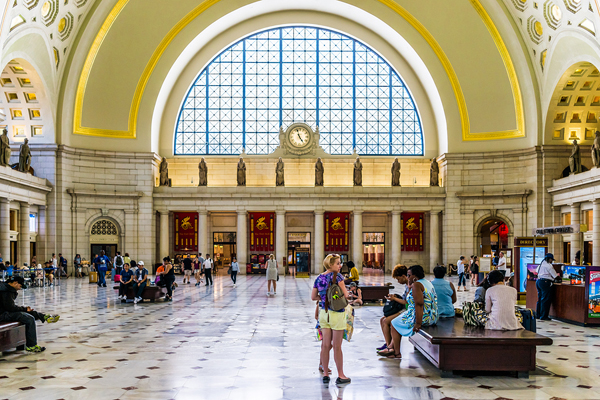Public Transportation in Washington DC
Summary: Mastering the public transportation system in Washington DC is a crucial aspect of adapting to life there. This article provides a detailed overview of the available local transit options.

Washington DC, the capital of the United States, boasts a robust public transportation system that includes the Metrorail (subway), Metrobus, DC Circulator, Capital Bikeshare, and even water taxis. With such a diverse range of options, it's entirely possible for an expat living in Washington DC to comfortably live without a car, relying on public transportation and walking. Each system offers its own unique advantages and caters to different travel needs, making it easy to navigate the city and its surrounding areas.
Metrorail
The Metrorail, commonly referred to as the "Metro," is the subway system that serves Washington DC and its surrounding suburbs. It's a popular choice for both locals and tourists due to its extensive network that covers six lines and 91 stations. The Metro is generally safe to use at any time of the day, with security personnel present at all stations. However, like any major city, it's always advisable to stay alert and aware of your surroundings, especially during off-peak hours. A single trip can cost anywhere from $2 to $6, depending on the distance traveled. The Metro also offers a variety of passes for unlimited travel, making it a cost-effective option for regular commuters.
Metrobus
Complementing the Metrorail is the Metrobus, a comprehensive bus service that covers areas not reached by the subway. With over 300 routes, the Metrobus is a reliable and convenient way to get around the city. It's also safe to use, with well-lit stops and onboard security cameras. The fare is $2 per trip, with various passes available for frequent riders. The Metrobus is particularly useful for reaching residential neighborhoods and local attractions that are off the main subway lines.
DC Circulator
The DC Circulator is a local bus service that operates six routes around the city's main tourist areas. It's an excellent option for sightseeing, with stops at popular destinations like the National Mall, Georgetown, and the Smithsonian museums. The DC Circulator is safe and easy to use, with a flat fare of $1 per trip. The buses run every 10 minutes, making it a convenient way to explore the city's landmarks.
Capital Bikeshare
For those who prefer a more active mode of transportation, the Capital Bikeshare offers over 500 stations across the city where you can rent a bike. It's a fun and eco-friendly way to get around, especially in the city's many bike-friendly neighborhoods. The cost starts at $2 for a single trip, with various membership options available for frequent users. While biking in the city is generally safe, it's important to follow traffic rules and wear a helmet.
Water Taxis
Adding a unique twist to the city's public transportation are the water taxis that operate on the Potomac River. They offer a scenic way to travel between destinations like Georgetown, The Wharf, and Alexandria. The water taxis are safe and comfortable, with indoor and outdoor seating available. Fares vary depending on the route, but generally range from $10 to $20 per trip.
In conclusion, Washington DC's public transportation system is diverse, reliable, and user-friendly. Whether you're commuting to work, exploring the city's landmarks, or simply enjoying a leisurely ride, there's a mode of transportation that suits your needs. So, if you're an expat living in Washington DC, rest assured that you can comfortably live without a car.
About the Author
 Betsy Burlingame is the Founder and President of Expat Exchange and is one of the Founders of Digital Nomad Exchange. She launched Expat Exchange in 1997 as her Master's thesis project at NYU. Prior to Expat Exchange, Betsy worked at AT&T in International
and Mass Market Marketing. She graduated from Ohio Wesleyan University
with a BA in International Business and German.
Betsy Burlingame is the Founder and President of Expat Exchange and is one of the Founders of Digital Nomad Exchange. She launched Expat Exchange in 1997 as her Master's thesis project at NYU. Prior to Expat Exchange, Betsy worked at AT&T in International
and Mass Market Marketing. She graduated from Ohio Wesleyan University
with a BA in International Business and German.
Some of Betsy's articles include 12 Best Places to Live in Portugal, 7 Best Places to Live in Panama and 12 Things to Know Before Moving to the Dominican Republic. Betsy loves to travel and spend time with her family. Connect with Betsy on LinkedIn.
Additional Information:
- Fun Classes for Expats Living in Washington DC
- Public Transportation in Washington DC
- Best Markets in Washington DC
- Retire in Washington DC Guide
- 7 Tips for Living in Washington DC
- Pros & Cons of Living in Washington DC
- Cost of Living in Washington DC
- Health Care in Washington DC
- Discovering the Best of Washington DC
- Healthcare in Washington, DC
- Washington, D.C.
- Best Places to Live in Washington, DC
- Healthcare & Health Insurance in Wash DC
- Real Estate in Wash DC
- 5 Tips For Tech Jobs in Washington DC



